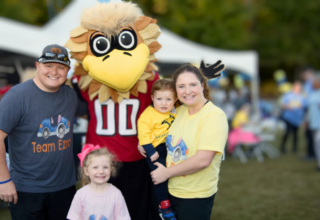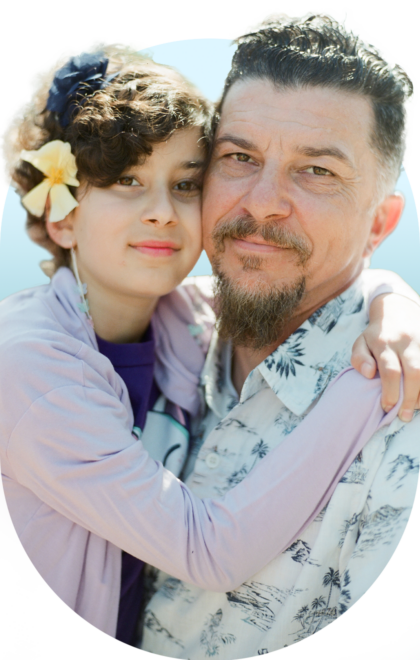
We Need Cures. We Need Action.
One mother shares her perspective about pediatric brain cancer's impact on the entire family.
The brain and spinal cord tumor journey is complex. It’s important to ask questions and get the answers you need. Below are some questions to ask soon after diagnosis to help you make decisions about your child’s hospital, team, and treatment.
Ask how many pediatric brain and spinal cord tumor patients the hospital sees each year. Generally speaking, hospitals that see a greater number of childhood brain tumor patients also have greater knowledge of the disease, treatment options, and clinical trials. Hospitals with the largest pediatric brain tumor programs in the U.S. see more than 100 new patients each year. Many other excellent programs see between 25 and 75 new patients each year.
Pediatric brain and spinal cord tumors are usually treated by a team of doctors and specialists. The team should include a pediatric neurosurgeon and at least one dedicated pediatric neuro-oncologist (a doctor who only treats children with brain and spinal cord tumors), a pediatric radiation oncologist, and a pediatric endocrinologist. The team may also include many others like nurse practitioners, social workers, and neuropsychologists.
You should also ask if your hospital has a tumor board where your child’s case will be reviewed by a team of doctors. If the hospital does, ask how the results of the tumor board will be communicated with you.
Ask about the clinical trials available at the hospital. Children with brain and spinal cord tumors may be eligible to participate in a clinical trial (a research study that tests how well new treatments work in patients). Many hospitals cooperate in groups to run these clinical trials for childhood brain and spinal cord tumor patients. The largest of these groups is the Children’s Oncology Group. Not every hospital on this list has a large pediatric neuro-oncology program, but all hospitals with a strong pediatric neuro-oncology program will likely appear on this list.
You are your child’s best advocate, and you have the right to meet with more than one neurosurgeon or neuro-oncologist before making this very important decision.
The doctor you’re working with should understand and respect your desire to ask what other pediatric neurosurgeons and/or neuro-oncologists you can talk to for a second opinion.
Many second opinions can be done without you traveling to that hospital. If that is the case, you may want to ask how you will hear the results of the second opinion.
Surgery on a child’s brain is different from surgery on an adult’s brain. Insist on a neurosurgeon who specializes in pediatrics and ask how many pediatric brain and spinal cord tumor surgeries the surgeon performs each year.
Generally speaking, neurosurgeons who operate on a greater number of pediatric brain and spinal cord tumor patients are likely to have greater experience, knowledge, and expertise.
There are more than 120 types of childhood brain tumors and many different types of treatment. Childhood brain and spinal cord tumors are also different from adult brain tumors.
Insist on an oncologist who specializes in pediatrics and ask how many new pediatric brain and spinal cord tumor patients the oncologist sees each year.
Generally speaking, an oncologist who specializes in childhood brain and spinal cord tumors and treats a greater number of those patients is likely to have greater experience, knowledge, and expertise.
Your doctor can provide information about the size and location of the tumor after looking at the first MRI or CT scans. During surgery, a pathologist will look at some of the tumor under a microscope and learn more about what type of tumor it is. More tests will be done on the tumor tissue after surgery. These tests take around 1-2 weeks to complete the diagnosis.
Talking to your child’s doctor about the type of tumor it is and how this kind of tumor responds to treatment will help you evaluate your child’s treatment options.
Your doctor may order molecular testing on tumor tissue removed during surgery. This testing checks for changes in genes that are often found in specific kinds of tumors. It’s helpful to know if your child’s tissue will be tested because it may give the medical team important information about the kind of treatment that could work best against the tumor.
Not all hospitals are able to do this work on-site so tissue might need to be preserved and sent to another institution for analysis.
Not every brain tumor is treated the same way. Most patients need surgery, but not all do. Many need radiation, but not all do. The same is true of chemotherapy. Before making a decision, ask your child’s doctor:
Ask as many questions as you need to before making a decision.
Even with the most aggressive brain and spinal cord tumors, children require time to heal after surgery before treatment can begin. Ask the doctor how quickly a treatment decision is needed. You don’t want to feel rushed as you gather information and ask questions.
Especially if you feel unsure about treatment decisions for your child, you should ask for a second opinion. Do not worry that it will offend your doctors. They should understand and respect your desire to have a second opinion and can make recommendations on how to get a second opinion and from whom.
Make sure that the second doctor or hospital gets all the information they will need, including the doctor’s summary, scans of the tumor, and any pathology reports.
If a second opinion differs from the first, you may wish to ask for a third opinion.
One mother shares her perspective about pediatric brain cancer's impact on the entire family.
Virtual Event
1:00 - 2:00 PM EST

